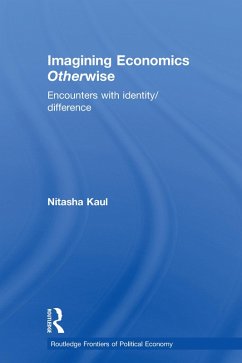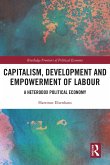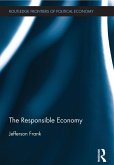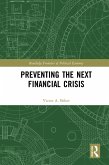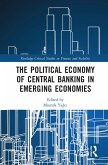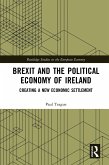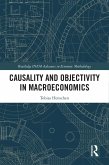48,95 €
48,95 €
inkl. MwSt.
Sofort per Download lieferbar

24 °P sammeln
48,95 €
Als Download kaufen

48,95 €
inkl. MwSt.
Sofort per Download lieferbar

24 °P sammeln
Jetzt verschenken
Alle Infos zum eBook verschenken
48,95 €
inkl. MwSt.
Sofort per Download lieferbar
Alle Infos zum eBook verschenken

24 °P sammeln
- Format: ePub
- Merkliste
- Auf die Merkliste
- Bewerten Bewerten
- Teilen
- Produkt teilen
- Produkterinnerung
- Produkterinnerung

Bitte loggen Sie sich zunächst in Ihr Kundenkonto ein oder registrieren Sie sich bei
bücher.de, um das eBook-Abo tolino select nutzen zu können.
Hier können Sie sich einloggen
Hier können Sie sich einloggen
Sie sind bereits eingeloggt. Klicken Sie auf 2. tolino select Abo, um fortzufahren.

Bitte loggen Sie sich zunächst in Ihr Kundenkonto ein oder registrieren Sie sich bei bücher.de, um das eBook-Abo tolino select nutzen zu können.
The result of a multifaceted investigation into the nature of knowledge produced by economics, this book re-examines certain understood ways of thinking about economics as a discipline, especially in relation to questions of identity and difference.
- Geräte: eReader
- mit Kopierschutz
- eBook Hilfe
- Größe: 0.5MB
Andere Kunden interessierten sich auch für
![Social Democracy in Capitalist Society (Routledge Revivals) (eBook, ePUB) Social Democracy in Capitalist Society (Routledge Revivals) (eBook, ePUB)]() Richard ScaseSocial Democracy in Capitalist Society (Routledge Revivals) (eBook, ePUB)35,95 €
Richard ScaseSocial Democracy in Capitalist Society (Routledge Revivals) (eBook, ePUB)35,95 €![Capitalism, Development and Empowerment of Labour (eBook, ePUB) Capitalism, Development and Empowerment of Labour (eBook, ePUB)]() Hartmut ElsenhansCapitalism, Development and Empowerment of Labour (eBook, ePUB)43,95 €
Hartmut ElsenhansCapitalism, Development and Empowerment of Labour (eBook, ePUB)43,95 €![The Responsible Economy (eBook, ePUB) The Responsible Economy (eBook, ePUB)]() Jefferson FrankThe Responsible Economy (eBook, ePUB)34,95 €
Jefferson FrankThe Responsible Economy (eBook, ePUB)34,95 €![Preventing the Next Financial Crisis (eBook, ePUB) Preventing the Next Financial Crisis (eBook, ePUB)]() Victor A. BekerPreventing the Next Financial Crisis (eBook, ePUB)40,95 €
Victor A. BekerPreventing the Next Financial Crisis (eBook, ePUB)40,95 €![The Political Economy of Central Banking in Emerging Economies (eBook, ePUB) The Political Economy of Central Banking in Emerging Economies (eBook, ePUB)]() The Political Economy of Central Banking in Emerging Economies (eBook, ePUB)51,95 €
The Political Economy of Central Banking in Emerging Economies (eBook, ePUB)51,95 €![Brexit and the Political Economy of Ireland (eBook, ePUB) Brexit and the Political Economy of Ireland (eBook, ePUB)]() Paul TeagueBrexit and the Political Economy of Ireland (eBook, ePUB)39,95 €
Paul TeagueBrexit and the Political Economy of Ireland (eBook, ePUB)39,95 €![Causality and Objectivity in Macroeconomics (eBook, ePUB) Causality and Objectivity in Macroeconomics (eBook, ePUB)]() Tobias HenschenCausality and Objectivity in Macroeconomics (eBook, ePUB)41,95 €
Tobias HenschenCausality and Objectivity in Macroeconomics (eBook, ePUB)41,95 €-
-
-
The result of a multifaceted investigation into the nature of knowledge produced by economics, this book re-examines certain understood ways of thinking about economics as a discipline, especially in relation to questions of identity and difference.
Dieser Download kann aus rechtlichen Gründen nur mit Rechnungsadresse in A, B, BG, CY, CZ, D, DK, EW, E, FIN, F, GR, HR, H, IRL, I, LT, L, LR, M, NL, PL, P, R, S, SLO, SK ausgeliefert werden.
Produktdetails
- Produktdetails
- Verlag: Taylor & Francis eBooks
- Seitenzahl: 304
- Erscheinungstermin: 4. Oktober 2007
- Englisch
- ISBN-13: 9781134175314
- Artikelnr.: 38250172
- Verlag: Taylor & Francis eBooks
- Seitenzahl: 304
- Erscheinungstermin: 4. Oktober 2007
- Englisch
- ISBN-13: 9781134175314
- Artikelnr.: 38250172
- Herstellerkennzeichnung Die Herstellerinformationen sind derzeit nicht verfügbar.
Nitasha Kaul is an economist, novelist, theorist, poet. She has a joint doctorate in Economics and Philosophy and was previously a tenured Lecturer (Assistant Professor) in Economics department at the Bristol Business School.?She is currently a Visiting Fellow at the Centre for the Study of Democracy, University of Westminster in London, and an Associate Professor in Creative Writing at the Royal Thimphu College in Bhutan. She speaks?within and outside academia, and has published books, essays in edited volumes, journal articles, and newspaper comments on the diverse themes of identity, economics, critical social theory, democracy, technology, gender, civic governmentality, and politics of knowledge production. Her novel Residue was shortlisted for the Man Asian Literary Prize in 2009.?Her next book is a scholarly monograph on the history, politics, and economy of Bhutan, the land of Gross National Happiness (GNH).?
Part 1: Looking Back Looking Ahead 1. Introduction 1.1 Introduction 1.2 The
Writing of Theory in Economics 1.3 The Overview 1.4 Signpost Part 2:
Rooting and Routing Economics 2. Enlightenment Epistemology and the
Subject-World of Economics 2.1 Introduction 2.2 Enterprise of Economics 2.3
Enlightenment and Epistemology 2.4 Subject-World of Economics 2.5 The
Theory and Science of Economics 2.6 Mathematical Formalism, Representation
and the Moralisation of Objectivity 2.7 Conclusion Part 3: Issues of
Knowledge and Difference 3. Modernist Rendition of Knowledge and the
Question of Difference 3.1 Introduction 3.2 Time and the Other of Modernist
Knowledge 3.3 Rousseau's Discourse On Political Economy 3.4 Subjectivity of
Modernist Knowledge and the Transcendental Pretence 3.5 Reason, History and
the Hegelian Dialectic 3.6 Human Nature and the Question of Difference 3.7
The Postcolonial Moment in Epistemology 3.8 Conclusion Part 4: Juxtaposing
Questions of Identity and the Economic 4. Identity Problematics 4.1 On
Identity 4.2 Abstract Essentialist Individual Identity 4.3 Critiquing the
Abstract Essentialist Individual View of Identity 4.4 The Orthodox and the
Heterodox: A Possible Dialogue 4.5 Rethinking the Relation of Identity and
Difference in Knowledge 4.6 The Politics of Identity 5. Economics and
Identity 5.1 Expanding 'Economics Inc.' (Economics Incorporated)? 5.2
Illustration One: Akerlof and Kranton on 'Economics and Identity' 5.3
Illustration Two: Sen On 'Reason Before Identity' 6. Rethinking Identity
Translationally and Reconsidering the Economic 6.1 Introduction 6.2
Concentric and Translational Architectures of Identity 6.3 Identity :
Economic: Culture: Economy 6.4 Conclusion Part 5: In Conclusion 7. Writing
Economic Theory Another Way 7.1 A Recap 7.2 Writing Economic Theory Another
Way 7.3 Pedagogy Re-Visited: Contextual Social Political Economices 7.4
Conclusion: Penpoints On Mirrors
Writing of Theory in Economics 1.3 The Overview 1.4 Signpost Part 2:
Rooting and Routing Economics 2. Enlightenment Epistemology and the
Subject-World of Economics 2.1 Introduction 2.2 Enterprise of Economics 2.3
Enlightenment and Epistemology 2.4 Subject-World of Economics 2.5 The
Theory and Science of Economics 2.6 Mathematical Formalism, Representation
and the Moralisation of Objectivity 2.7 Conclusion Part 3: Issues of
Knowledge and Difference 3. Modernist Rendition of Knowledge and the
Question of Difference 3.1 Introduction 3.2 Time and the Other of Modernist
Knowledge 3.3 Rousseau's Discourse On Political Economy 3.4 Subjectivity of
Modernist Knowledge and the Transcendental Pretence 3.5 Reason, History and
the Hegelian Dialectic 3.6 Human Nature and the Question of Difference 3.7
The Postcolonial Moment in Epistemology 3.8 Conclusion Part 4: Juxtaposing
Questions of Identity and the Economic 4. Identity Problematics 4.1 On
Identity 4.2 Abstract Essentialist Individual Identity 4.3 Critiquing the
Abstract Essentialist Individual View of Identity 4.4 The Orthodox and the
Heterodox: A Possible Dialogue 4.5 Rethinking the Relation of Identity and
Difference in Knowledge 4.6 The Politics of Identity 5. Economics and
Identity 5.1 Expanding 'Economics Inc.' (Economics Incorporated)? 5.2
Illustration One: Akerlof and Kranton on 'Economics and Identity' 5.3
Illustration Two: Sen On 'Reason Before Identity' 6. Rethinking Identity
Translationally and Reconsidering the Economic 6.1 Introduction 6.2
Concentric and Translational Architectures of Identity 6.3 Identity :
Economic: Culture: Economy 6.4 Conclusion Part 5: In Conclusion 7. Writing
Economic Theory Another Way 7.1 A Recap 7.2 Writing Economic Theory Another
Way 7.3 Pedagogy Re-Visited: Contextual Social Political Economices 7.4
Conclusion: Penpoints On Mirrors
Part 1: Looking Back Looking Ahead 1. Introduction 1.1 Introduction 1.2 The
Writing of Theory in Economics 1.3 The Overview 1.4 Signpost Part 2:
Rooting and Routing Economics 2. Enlightenment Epistemology and the
Subject-World of Economics 2.1 Introduction 2.2 Enterprise of Economics 2.3
Enlightenment and Epistemology 2.4 Subject-World of Economics 2.5 The
Theory and Science of Economics 2.6 Mathematical Formalism, Representation
and the Moralisation of Objectivity 2.7 Conclusion Part 3: Issues of
Knowledge and Difference 3. Modernist Rendition of Knowledge and the
Question of Difference 3.1 Introduction 3.2 Time and the Other of Modernist
Knowledge 3.3 Rousseau's Discourse On Political Economy 3.4 Subjectivity of
Modernist Knowledge and the Transcendental Pretence 3.5 Reason, History and
the Hegelian Dialectic 3.6 Human Nature and the Question of Difference 3.7
The Postcolonial Moment in Epistemology 3.8 Conclusion Part 4: Juxtaposing
Questions of Identity and the Economic 4. Identity Problematics 4.1 On
Identity 4.2 Abstract Essentialist Individual Identity 4.3 Critiquing the
Abstract Essentialist Individual View of Identity 4.4 The Orthodox and the
Heterodox: A Possible Dialogue 4.5 Rethinking the Relation of Identity and
Difference in Knowledge 4.6 The Politics of Identity 5. Economics and
Identity 5.1 Expanding 'Economics Inc.' (Economics Incorporated)? 5.2
Illustration One: Akerlof and Kranton on 'Economics and Identity' 5.3
Illustration Two: Sen On 'Reason Before Identity' 6. Rethinking Identity
Translationally and Reconsidering the Economic 6.1 Introduction 6.2
Concentric and Translational Architectures of Identity 6.3 Identity :
Economic: Culture: Economy 6.4 Conclusion Part 5: In Conclusion 7. Writing
Economic Theory Another Way 7.1 A Recap 7.2 Writing Economic Theory Another
Way 7.3 Pedagogy Re-Visited: Contextual Social Political Economices 7.4
Conclusion: Penpoints On Mirrors
Writing of Theory in Economics 1.3 The Overview 1.4 Signpost Part 2:
Rooting and Routing Economics 2. Enlightenment Epistemology and the
Subject-World of Economics 2.1 Introduction 2.2 Enterprise of Economics 2.3
Enlightenment and Epistemology 2.4 Subject-World of Economics 2.5 The
Theory and Science of Economics 2.6 Mathematical Formalism, Representation
and the Moralisation of Objectivity 2.7 Conclusion Part 3: Issues of
Knowledge and Difference 3. Modernist Rendition of Knowledge and the
Question of Difference 3.1 Introduction 3.2 Time and the Other of Modernist
Knowledge 3.3 Rousseau's Discourse On Political Economy 3.4 Subjectivity of
Modernist Knowledge and the Transcendental Pretence 3.5 Reason, History and
the Hegelian Dialectic 3.6 Human Nature and the Question of Difference 3.7
The Postcolonial Moment in Epistemology 3.8 Conclusion Part 4: Juxtaposing
Questions of Identity and the Economic 4. Identity Problematics 4.1 On
Identity 4.2 Abstract Essentialist Individual Identity 4.3 Critiquing the
Abstract Essentialist Individual View of Identity 4.4 The Orthodox and the
Heterodox: A Possible Dialogue 4.5 Rethinking the Relation of Identity and
Difference in Knowledge 4.6 The Politics of Identity 5. Economics and
Identity 5.1 Expanding 'Economics Inc.' (Economics Incorporated)? 5.2
Illustration One: Akerlof and Kranton on 'Economics and Identity' 5.3
Illustration Two: Sen On 'Reason Before Identity' 6. Rethinking Identity
Translationally and Reconsidering the Economic 6.1 Introduction 6.2
Concentric and Translational Architectures of Identity 6.3 Identity :
Economic: Culture: Economy 6.4 Conclusion Part 5: In Conclusion 7. Writing
Economic Theory Another Way 7.1 A Recap 7.2 Writing Economic Theory Another
Way 7.3 Pedagogy Re-Visited: Contextual Social Political Economices 7.4
Conclusion: Penpoints On Mirrors
